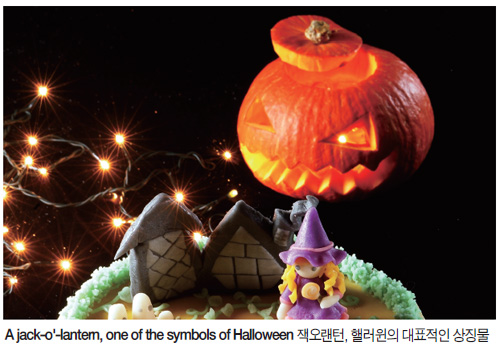영어로 공부하는 동서문화 | Why Is Halloween Spooky?
[칼럼]
My world shall be the world of creation-transformation, for it shall be the world in which spirits and humans become one. My work shall be accomplished by uniting the virtues of humans and spirits into one. - English Dojeon 2:40 -
내 세상은 조화의 세계요, 신명과 인간이 하나 되는 세계니라.
내 일은 인신합덕(人神合德)으로 되느니라.
내 세상은 조화의 세계요, 신명과 인간이 하나 되는 세계니라.
내 일은 인신합덕(人神合德)으로 되느니라.
creation [kriːéiʃən 크뤼-에이션] 창조
transformation [træ̀nsfǝrméiʃən 츠뤤스풔메이션] 변형, 변화
spirit [spírit 스삐륏] 정신, 영혼
accomplish [ǝkάmpliʃ 어캄플리쉬] 이루다
virtue [və́ːrtʃuː 붜r-츄-] 덕, 덕행

핼러윈은 왜 으스스하게 느껴지는 걸까?
We associated Halloween with witches, goblins, ghosts, and other spooky things. But the word Halloween actually means ‘holy evening.’
‘핼러윈’ 하면 마녀, 혼백, 유령이나 다른 으스스한 것들을 연상하게 된다. 그렇지만 핼러윈이라는 말은 ‘성스러운 저녁’이라는 뜻이다.
Centuries ago, Celtic people in Europe celebrated a festival on October 31, which was the last day of their year and the end of their harvest season. Many Celts believed that on this night, the spirits of death met to gather up the souls of all those who had died in the previous year, or to visit the living for warmth as winter neared. Witches also were thought to meet on Halloween. To protect themselves from these wandering spirits, people lit bonfires.
수백 년 전 유럽에 살던 켈트족은 일 년의 마지막 날이자 그 해 수확기의 마지막 날이기도 한 10월 31일을 명절로 기념했다. 그들은 이날 밤에 죽음의 혼령들이 지난해 죽은 자들의 영혼을 한군데로 모으거나, 추운 겨울이 다가오기 때문에 온기를 얻으려고 살아 있는 사람을 찾아간다고 믿었다. 마녀들도 핼러윈 때 모이는 것으로 여겨졌다. 사람들은 이렇게 떠돌아다니는 혼령들로부터 자신을 보호하기 위해 모닥불을 지폈다.
When christianity came to Europe, the first two days of November became religious holidays, ‘All Saints’ Day’ and ‘All Souls’ Day.’ But the night before All Saints’ Day, called “All Hallows Eve” or “Halloween,” was still thought of as a spooky night, a night for witches.
기독교가 유럽에 전파되면서 11월의 첫 이틀을 종교적인 축일로 정하였는데, 이것이 곧 만성절과 만령절이다. 그러나 ‘만성절 전야’, 또는 ‘핼러윈’이라고 불리는 만성절 전날 밤인 10월 31일은 여전히 으스스한 밤, 마녀들의 밤으로 여겨졌다.
The custom of “trick or treat” on Halloween began in Ireland, where groups of people went from house to house asking for food and gifts for the festival held on that night.
핼러윈 때 외치는 ‘trick or treat’은 그날 밤 축제에 쓸 음식과 선물을 얻으려고 떼를 지어 집집마다 몰려다니던 아일랜드인들의 풍습에서 비롯된 것이다.
[출처: James Meyers, Varce Johnsom, MoonJin Media, There’s a Reason for Everything(1999) p. 144]
Words
spooky [spúːki 스뿌-끼] 유령이 나올 것 같은, 무시무시한associate [ǝsóuʃièit 어쏘우쉬에잇] 연상하다
witch [witʃ 위취] 마녀
goblin [gάblin 가블린] 악귀, 도깨비
ghost [goust 고우스트] 유령
actually [ǽktʃuǝli 액츄얼리] 실제로
holy [hóuli 호울리] 신성한
century [séntʃuri 쎈츄뤼] 1세기, 백 년
celebrate [sélǝbrèit 쎌러브뤠잇] 경축하다
harvest [hάːrvist 하r-뷔스트] 수확, 추수
believe [bilíːv 빌리-브] 믿다
spirit [spírit 스삐륏] 영(靈)(soul)
soul [soul 쏘울] (영)혼, 넋; 정신, 마음
previous [príːviǝs 프뤼-뷔어스] 앞의, 이전의
warmth [wɔːrmθ 웜-쓰] 따뜻함, 온기
protect [prǝtékt 프뤄텍트] 보호하다
wandering [wάndǝriŋ 완더륑] 헤매는, 방랑하는
light [lait 라잇] (p., pp. lit [lit]) …에 불을 켜다
bonfire [bάnfàiǝr 반-퐈이어] 모닥불
religious [rilídʒǝs 륄리줘스] 종교의
saint [seint 쎄인트] 성인(聖人)
custom [kʌ́stǝm 커스텀] 관습, 풍습
trick [trik 츠뤽] 속임수, 장난
treat [triːt 츠륏-] 특별한 것[선물], 대접, 한턱
hold [hould 호울드] 열다, 개최하다
© 월간개벽. All rights reserved.

